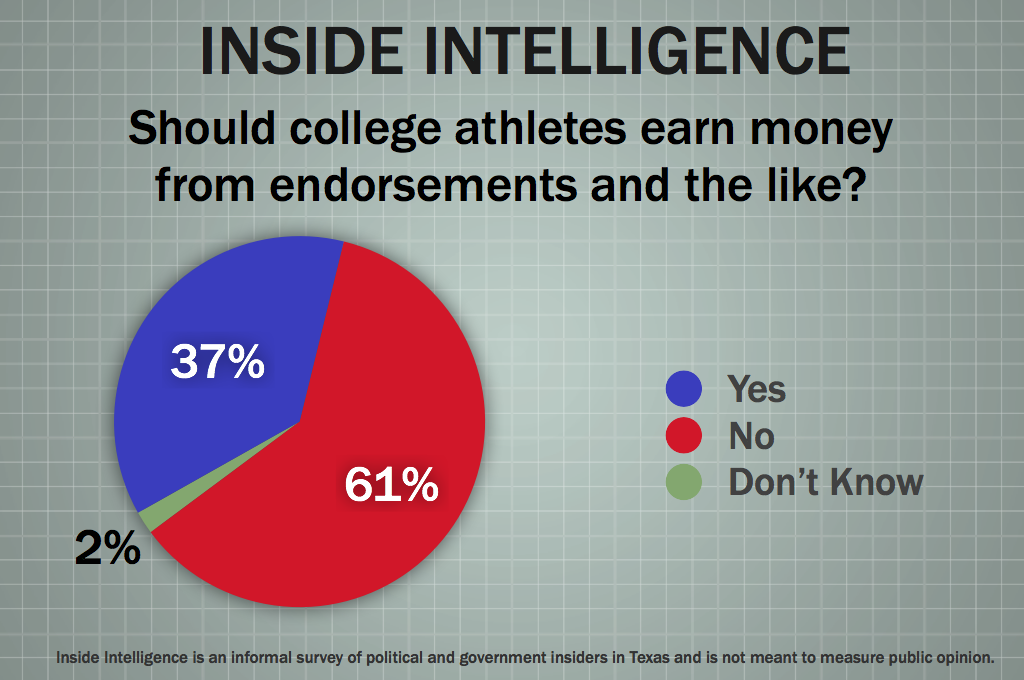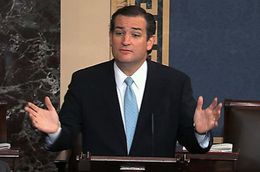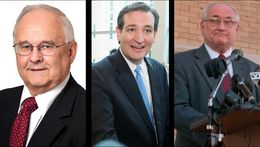This week, we asked the insiders in government and politics about college sports and college athletes, starting off with the big question — should college athletes be paid to play? — and finding a 49 percent to 49 percent split in the answer.
A 61 percent majority said student athletes should not be allowed to earn outside income from endorsements, signing memorabilia and the like. But they were even-handed, too, with 60 percent saying the colleges should not be allowed to use players’ names and faces in their own marketing without compensating the players for it.
Finally, we asked whether student athletes should continue to offered college scholarships if they were also allowed to be paid for playing. Slightly more than half of our insiders said they should be.
We collected comments along the way and have attached a full set. Here’s a sampling of what the insiders said:

.
Should college athletes be paid to play?
• "Why pretend any longer that college sports are for student athletes. It is professional."
• "You mean in addition to free tuition, room, board, trainers, tutors, and athletic clothing?"
• "They are being paid with full-ride scholarships and amenities that the typical college student can only dream about. And they're receiving an education that will serve them long after their knees won't."
• "You mean above-the-board?"
• "College sports should remain amateur and unpaid -- to paraphrase the Little Prince, what the NCAA says they are, they should be really -- a program that allows kids to participate in sports while pursuing an academic degree."
• "They make the School tons of money."
• "I would feel a lot more justified in booing teenagers if I knew they were at least drawing a paycheck."
• "College is about education, not sports."
• "The NCAA and its universities have created a modern form of slavery and no one is outraged by it. The student athlete sacrifices his body; gets to live with long-term health issues; and as a whole make billions of dollars for a select group of men and institutions. And what do they get? Nada! There is something morally wrong with this picture."
• "They basically are getting paid, anybody priced Baylor lately?"
• "A really big business where everyone does very well except the people actually doing the work."

.
Should college players be allowed to earn outside income from endorsements, selling signatures, and the like?
• "I think they should but if they are on scholarship then whatever they earn should supplant scholarship money."
• "Yes. Split with universities for as long as student athlete wears the uniform. Put in escrow for use when degree is obtained."
• "But they should have to split it with the university and the NCAA and the broadcast carriers who give them the brand and the opportunity and platform to make money."
• "As long as controls are in place to ensure outcomes are not being paid for, then there is no reason to get in the way of this."
• "No. If a kid wants to become a professional, he should go pro."
• "That money should go to the scholarships for others not involved in athletics"
• "If the school is allowed to sell their jersey, if the NCAA is allowed to sell their likeness in perpetuity, then they ought to be able to share in those riches."
• "Yes. If someone wants to pay you for your signature on a jersey, go for it!"
• "YES! The question should be: Why shouldn't players be allowed to earn outside income from endorsements, etc."
• "Really? Please. These young men and women need to be grateful for the opportunity they are given as an athlete. Should professional athletes start getting a share of the TV revenue that their leagues get and a cut of the profit the team owners get? Not!"

.
Should colleges — public or private — be allowed to use players names and faces in their own advertising and product deals without compensating the players?
• "Players should not be treated as a commodity but as a partner in generating profit for the school."
• "Will the colleges let me sell items with their brand without compensation? Ok then."
• "Of course they should. These athletes are getting plenty in return for their playing time."
• "No, but that doesn't mean the players should be compensated. Amateur is amateur."
• "Again, players have been treated as personal property by these institutions. Use them, abuse them, make as much money as possible from them, and then dispose of them for the next great thing."
• "This is not about the individual. Whatever happened to Big Team Little Me? Perhaps this is a reflection of our self-centered culture."
• "Yes, because the players ARE being compensated--they get to graduate debt-free. How many college students can say that?"
• "That's the deal. Even if they're not paid (and I think they should be), colleges use sports for fundraising, and nothing brings in the money like an All-American."

.
If student-athletes were paid, should they also be offered scholarships in addition to that pay?
• "The scholarships are the pay. Other students in more valued fields do not receive pay for significant work, like research related studies"
• "The schools make a lot of money off of their participation and work."
• "Most students are offered scholarships in some form or fashion. But, only a few students generate revenue. When the math club starts selling out stadiums, pay them on top of their scholarships too."
• "Non-student athletes are given scholarships and fellowship stipends regularly... bet you didn't even know that... why should a student-athlete be treated differently."
• "How about a guaranteed four-year scholarship, so that the kid can at least get an education - even if they tear an ACL."
• "Someone on a scholarship can also be on work study. Why shouldn't athletes?"
Our thanks to this week's participants: Gene Acuna, Cathie Adams, Brandon Aghamalian, Jenny Aghamalian, Victor Alcorta, Clyde Alexander, George Allen, Jay Arnold, Louis Bacarisse, Charles Bailey, Dave Beckwith, Andrew Biar, Allen Blakemore, Tom Blanton, Chris Britton, David Cabrales, Lydia Camarillo, Kerry Cammack, Snapper Carr, Janis Carter, Corbin Casteel, William Chapman, Kevin Cooper, Addie Mae Crimmins, Beth Cubriel, Randy Cubriel, Denise Davis, Hector De Leon, June Deadrick, Nora Del Bosque, Tom Duffy, Jeff Eller, Jack Erskine, John Esparza, Jon Fisher, Wil Galloway, Norman Garza, Dominic Giarratani, Bruce Gibson, Kinnan Golemon, Daniel Gonzalez, Jim Grace, Thomas Graham, Kathy Grant, John Greytok, Clint Hackney, Wayne Hamilton, Bill Hammond, John Heasley, Ken Hodges, Deborah Ingersoll, Cal Jillson, Bill Jones, Mark Jones, Robert Jones, Lisa Kaufman, Robert Kepple, Richard Khouri, Tom Kleinworth, Dale Laine, Nick Lampson, Pete Laney, Dick Lavine, James LeBas, Luke Legate, Ruben Longoria, Vilma Luna, Matt Mackowiak, Luke Marchant, Dan McClung, Mike McKinney, Robert Miller, Bee Moorhead, Mike Moses, Nelson Nease, Pat Nugent, Todd Olsen, Nef Partida, Gardner Pate, Robert Peeler, Jerry Philips, Wayne Pierce, Richard Pineda, Allen Place, Gary Polland, Jay Propes, Bill Ratliff, Brian Rawson, Karen Reagan, Tim Reeves, Patrick Reinhart, David Reynolds, Boyd Richie, Kim Ross, Grant Ruckel, Jason Sabo, Andy Sansom, Jim Sartwelle, Stan Schlueter, Bruce Scott, Robert Scott, Christopher Shields, Jason Skaggs, Brian Sledge, Ed Small, Todd Smith, Larry Soward, Leonard Spearman, Dennis Speight, Tom Spilman, Jason Stanford, Bill Stevens, Bob Strauser, Colin Strother, Charles Stuart, Michael Quinn Sullivan, Sherry Sylvester, Jay Thompson, Russ Tidwell, Trey Trainor, Vicki Truitt, Ware Wendell, David White, Darren Whitehurst, Seth Winick, Peck Young, Angelo Zottarelli.











